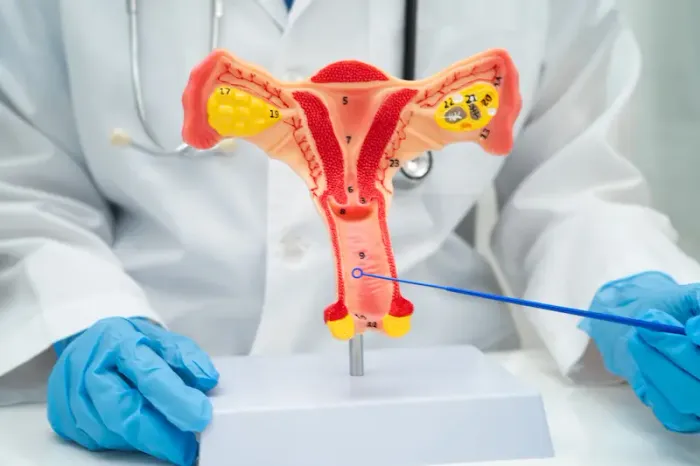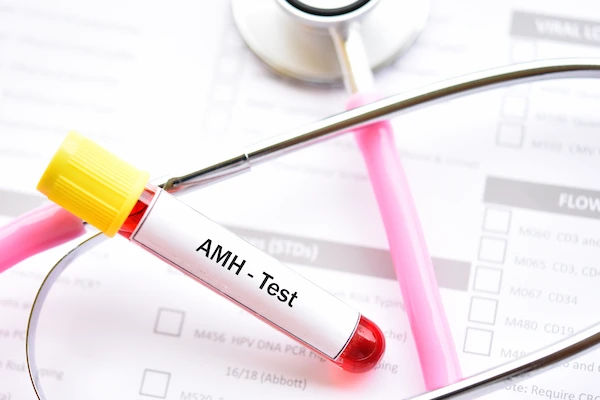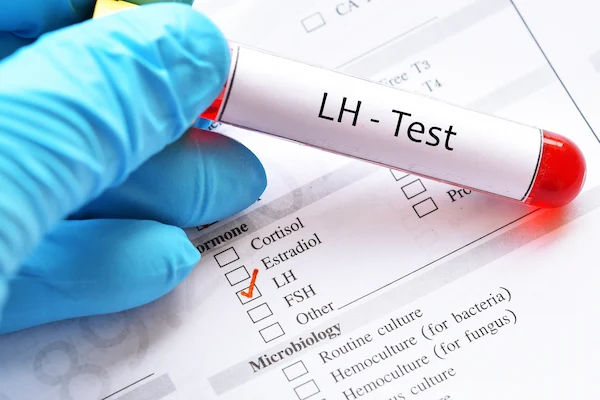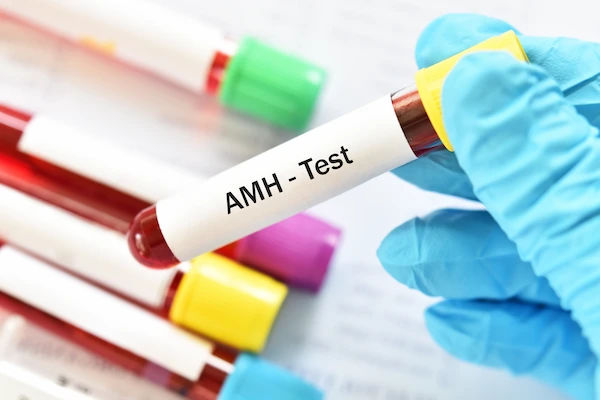AMH Test and Normal Blood Levels
Learn about the AMH test, its role in assessing ovarian reserve and fertility, and understand what normal blood levels mean for reproductive health.

Written by Dr. J T Hema Pratima
Reviewed by Dr. Dhankecha Mayank Dineshbhai MBBS
Last updated on 3rd Sep, 2025

Introduction
If you're trying to conceive or just curious about your reproductive health, you may have heard about the Anti-Müllerian Hormone (AMH) test. This simple blood test can provide valuable insights into your ovarian reserve, the number of eggs you have left in your ovaries.
In this article, we’ll break down everything you need to know about the AMH test, including: what is the AMH test?, why is it important?, what are normal AMH levels?, what do high or low AMH levels mean?, how can you improve your ovarian reserve? and when should you consider taking the test?
Let’s dive in!
What is the AMH Test?
The AMH (Anti-Müllerian Hormone) test measures the level of a hormone produced by small follicles in your ovaries. These follicles contain immature eggs, and the amount of AMH in your blood gives doctors an estimate of your ovarian reserve, how many eggs you have left.
Unlike other fertility tests that must be done at a specific time in your menstrual cycle, the AMH test can be taken any day of the month, making it a convenient option.
Consult a Gynaecologist for the best advice
Why is the AMH Test Important?
The AMH test is commonly used for:
1. Fertility Assessment – Helps women understand their egg count, especially if they’re planning for pregnancy later in life.
2. IVF (In Vitro Fertilization) Planning – Doctors use AMH levels to predict how well a woman might respond to fertility treatments.
3. Diagnosing PCOS (Polycystic Ovary Syndrome) – Women with PCOS often have higher-than-normal AMH levels.
4. Early Menopause Prediction – Low AMH may indicate a declining ovarian reserve, which could mean early menopause.
5. Monitoring Ovarian Health – Useful for women who have undergone chemotherapy or ovarian surgery.
What Are Normal AMH Levels?
AMH levels vary by age and individual health. Here’s a general guideline:
Age Group |
What Do High AMH Levels Mean?
High AMH levels mean:
• Possible PCOS – High AMH is often linked to Polycystic Ovary Syndrome.
• Higher Egg Reserve – May indicate a good number of eggs, but doesn’t always mean better fertility.
What Do Low AMH Levels Mean?
Low AMH levels mean:
• Reduced Ovarian Reserve – Fewer eggs left, which may make conception harder.
• Early Menopause Risk – Could signal that menopause may occur earlier than average.
Note: AMH levels alone don’t determine fertility; egg quality and other factors also play a role.
Can You Improve Your AMH Levels?
While AMH levels naturally decline with age, certain lifestyle changes may help support ovarian health:
• Eat a Balanced Diet – Include antioxidants (berries, nuts, leafy greens), omega-3s (fish, flaxseeds), and vitamin D.
• Exercise Regularly – Moderate activity supports hormonal balance.
• Manage Stress – High stress can affect reproductive hormones. Try yoga, meditation, or deep breathing.
• Avoid Smoking & Excessive Alcohol – These can accelerate ovarian aging.
• Consider Supplements – CoQ10, DHEA, and vitamin D may support egg health (consult a doctor first).
When Should You Take an AMH Test?
Consider the AMH test if:
• You’re planning pregnancy and want to understand your fertility status.
• You’re over 35 and concerned about declining egg count.
• You have irregular periods or suspect PCOS.
• You’ve had cancer treatments that may affect fertility.
• You’re considering egg freezing or IVF.
How to Get Tested?
The AMH test is a simple blood test that can be done at any time. If you’d like to check your AMH levels, you can:
• Book a test online through Apollo 24|7 for a hassle-free experience.
• Consult a fertility specialist if your results are concerning.
Get Your Health Assessed
Final Thoughts
The AMH test is a useful tool for understanding your ovarian reserve, but it’s just one piece of the fertility puzzle. If you’re worried about your results, remember that low AMH doesn’t always mean you can’t conceive; many women with low AMH still get pregnant naturally or with treatment.
Consult a Gynaecologist for the best advice
Consult a Gynaecologist for the best advice

Dr Swatika Kumari
Obstetrician and Gynaecologist
19 Years • MBBS, DGO, DNB Obstetrics & Gynaecology
Nashik
Apollo 24|7 Clinic - Maharashtra, Nashik

Dr Hymavathi Kaliki
Obstetrician and Gynaecologist
45 Years • MBBS, DGO, MD (Obstetrics & Gynaecology), FICS -USA (Fellowship - International College of Surgeons - Obstetrics & Gynaecology), FART (Fellowship - Assisted Reproductive Technology)
Visakhapatnam
Apollo 24|7 Clinic - Andhra Pradesh, Visakhapatnam

Dr. Priyanka Surisetty
Obstetrician and Gynaecologist
8 Years • MBBS, DGO
Visakhapatnam
Apollo 24|7 Clinic - Andhra Pradesh, Visakhapatnam

Dr. Srinka Mukherjee
Obstetrician and Gynaecologist
7 Years • MBBS, MS Obstetrics & Gynaecology
Kolkata
VDC Clinic, Kolkata

Dr. Sreeparna Roy
Obstetrician and Gynaecologist
8 Years • MBBS , MS (OBSTETRICS & GYNAECOLOGY), Fellowship in Infertility, Endoscopy & Ultrasonography), Fellowship in Laparoscopy & Hysteroscopy,DRM
Kolkata
Dr Utsa Basu Clinic, Kolkata
Consult a Gynaecologist for the best advice

Dr Swatika Kumari
Obstetrician and Gynaecologist
19 Years • MBBS, DGO, DNB Obstetrics & Gynaecology
Nashik
Apollo 24|7 Clinic - Maharashtra, Nashik

Dr Hymavathi Kaliki
Obstetrician and Gynaecologist
45 Years • MBBS, DGO, MD (Obstetrics & Gynaecology), FICS -USA (Fellowship - International College of Surgeons - Obstetrics & Gynaecology), FART (Fellowship - Assisted Reproductive Technology)
Visakhapatnam
Apollo 24|7 Clinic - Andhra Pradesh, Visakhapatnam

Dr. Priyanka Surisetty
Obstetrician and Gynaecologist
8 Years • MBBS, DGO
Visakhapatnam
Apollo 24|7 Clinic - Andhra Pradesh, Visakhapatnam

Dr. Srinka Mukherjee
Obstetrician and Gynaecologist
7 Years • MBBS, MS Obstetrics & Gynaecology
Kolkata
VDC Clinic, Kolkata

Dr. Sreeparna Roy
Obstetrician and Gynaecologist
8 Years • MBBS , MS (OBSTETRICS & GYNAECOLOGY), Fellowship in Infertility, Endoscopy & Ultrasonography), Fellowship in Laparoscopy & Hysteroscopy,DRM
Kolkata
Dr Utsa Basu Clinic, Kolkata




.webp)
